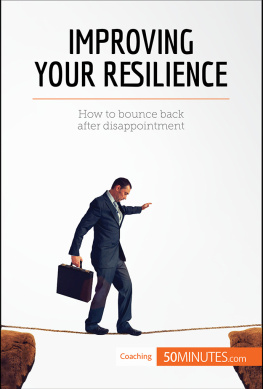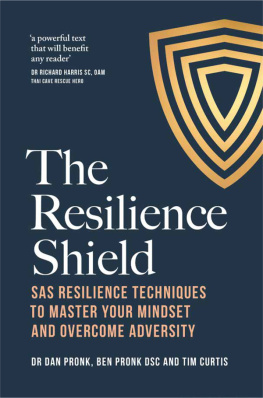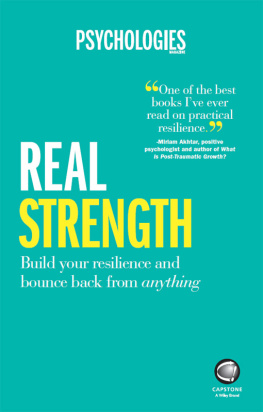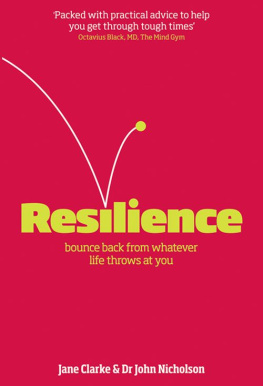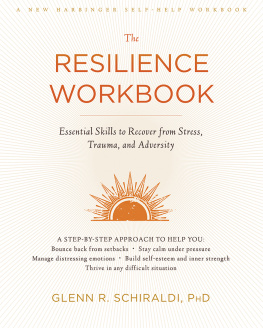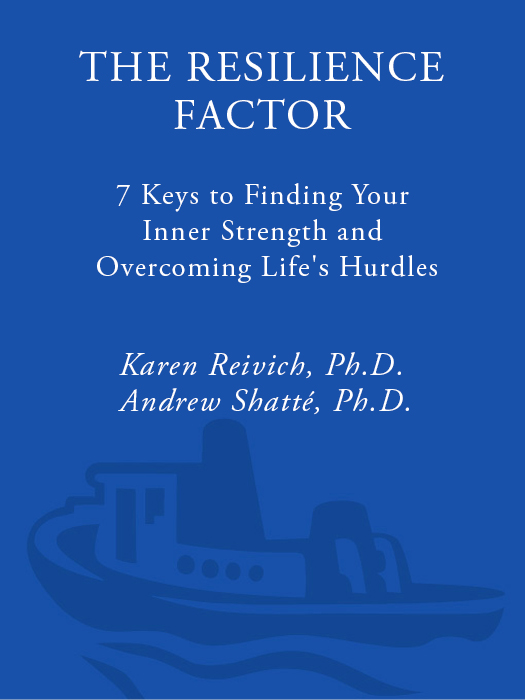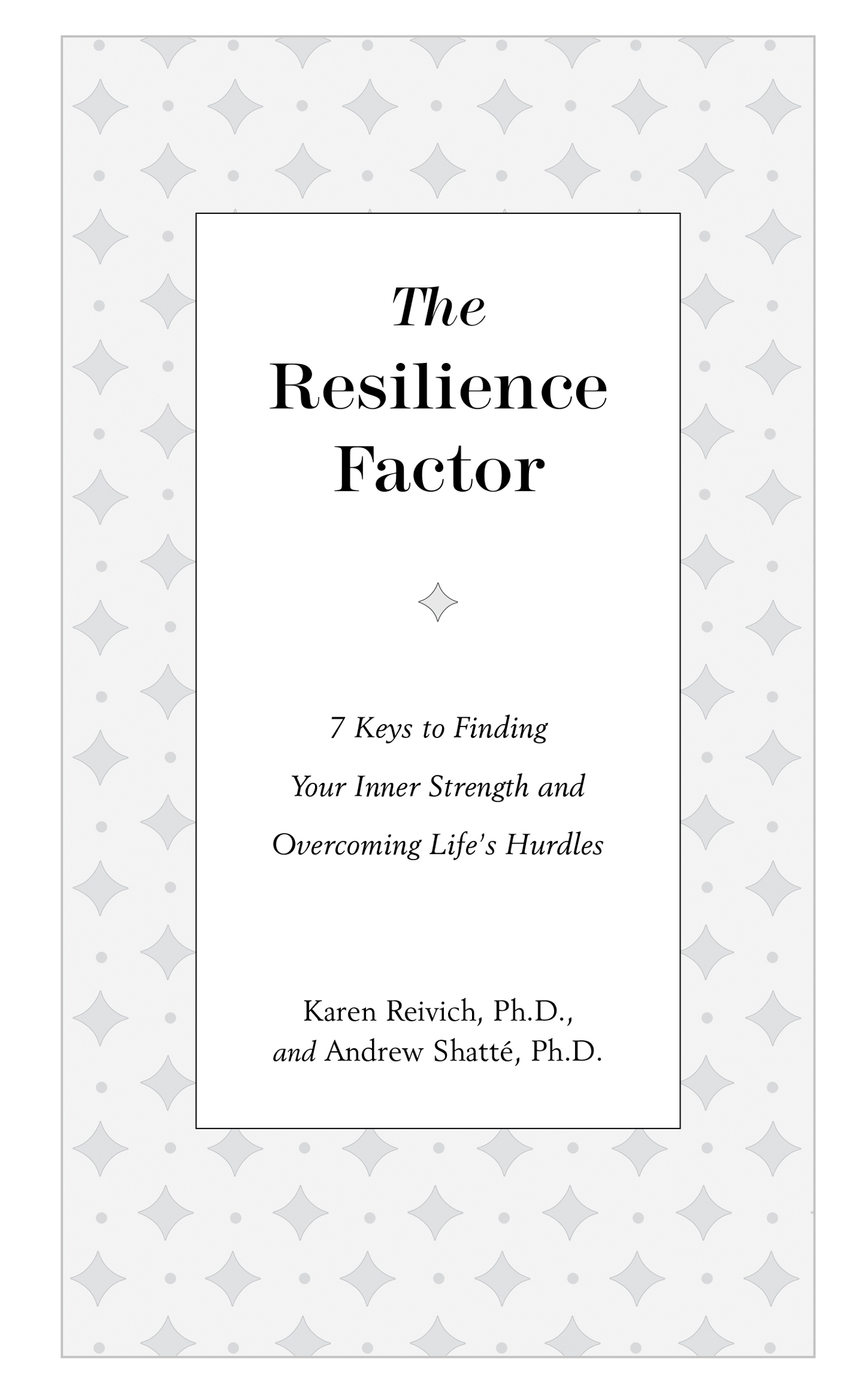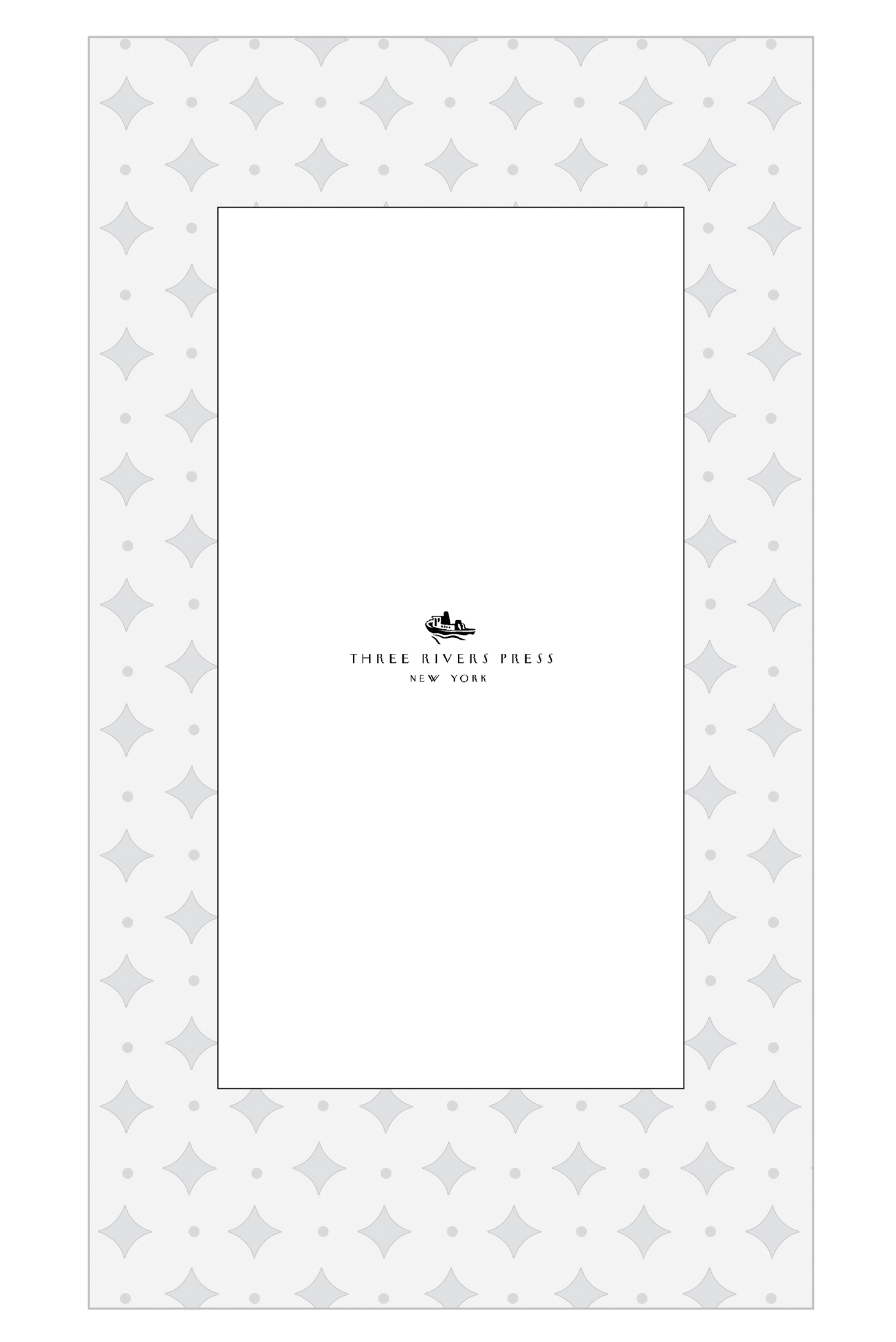For Veronica and for my parents,
Betty and Lloyd
AJS
For my
husband, Guy, and our three sons,
Aaron, Jacob, and Jonathan
KJR
INTRODUCTION
H ow many times in the last week have you said to yourself, I cant take this stress anymore, or Why do I keep overreacting to such little things, or even Is this all there is to life? Or maybe things are going just fine, but you keep thinking that somethings missing. If youre like most Americans, burning the candle at both ends or just feeling worn out from juggling too many obligations, youve probably had thoughts along these lines recently. What you need is more resiliencethe ability to persevere and adapt when things go awry.
Everyone needs resilience, because one thing is certain, life includes adversities. There are the inevitable daily hassleswork dumped on your desk at 4:45 P.M., children who need to be in different places at the same time, disagreements with your significant other. There are probably major setbacks tooa lost job, a failed relationship. And recent events have shown that our lives may also be touched by great trauma. But if you increase your resilience, you can overcome most of what life puts in your way.
Its such an important concept that it bears repeating: Everyone needs resilience. More than fifty years of scientific research have powerfully demonstrated that resilience is the key to success at work and satisfaction in life. Where you fall on the resilience curveyour natural reserves of resilienceaffects your performance in school and at work, your physical health, your mental health, and the quality of your relationships. It is the basic ingredient to happiness and success.
How resilient are you? Our research shows that most people consider themselves to be fairly resilient. But the reality is that most of us arent emotionally or psychologically prepared to handle adversity, which means that instead of facing our problems bravely and confidently, we risk giving up and feeling helpless. And even though you may be resilient in certain ways and in specific areas of your life, you may need help in others. Our studies indicate that resilience is made up of seven distinct abilities, and almost no one is good at them all.
Can you boost your resilience? Absolutely. Its all about changing the way you think about adversity. For more than three decades psychologists have investigated how our thinking processes affect our resilience, and the role of resilience in achieving success and satisfaction. As therapists and scientists, we have focused on how to change peoples thinking so they can build greater resilience, and weve had enormous successenhancing the resilience of parents, of couples, of workers in the corporate world, and helping children at risk for depression and college freshmen who were underachieving.
In this book you will get to measure your own resilience, and well show you your resilience strengths and those areas on which you could improve. Our goal is to teach you the seven skills of resilience that we have developed over the last fifteen years. These seven skills will lead you to a thorough understanding of how and why you think the way you do. Armed with the self-awareness they provide, thousands of children, adolescents, parents, and corporate employees have used the skills to become happier, more productive, more successful, and more balanced in their lives.
A Thought Experiment
Would you indulge us for a minute or two? We ask that you vividly cast yourself as the lead actor in the following scene. Imagine, if you will, that you have been working longer hours than usual lately. While your job does have periodic project crunches that last a few days or even a week, this latest stint has been a marathonweeks of ridiculously long days that have left you sapped and spent.
Todays been particularly trying. The tribulations began as soon as you arrived at the office at 8:00 this morning. Awaiting you were three voice-mail messages. The first was from a customer complaining that they still had not received a deliverable from your department that they had expected days earlier. A second was from your assistant, who glumly announced that the figures he gave you yesterday, and which you spent most of your day folding into your major project, had a minor inaccuracy. The third came from your director, demanding to know when the work would be completed and reminding you, as if you needed reminding, that the project was already overdue and over budget. All this before 9:00 A.M.
The rest of the day is more of the same. When you finally call it quits at 6:30 that evening and point the car toward home, youre lost in a fantasy about being with your loved ones and sinking into that big, comfy sofa. Your youngest child will already be asleepthis makes the second time this week youve missed her bedtime. Still, youll read to your son for a while, have a bite to eat, and catch up with your spouse. But its not to be.
As you walk through your front door, you can already feel the tension. Youve barely had time to decompress when your spouse angrily says to you, I know we both agreed that you should take this job, that it would be good for your career. But this is getting pretty frustrating. Im stuck doing most of the chores around here and the kids really miss you.
What is going through your mind as you experience this scene? What emotions are you feeling? What would you do?
Likewise, what goes through your mind when you hear those persistent rumors of downsizing in your organization? How do you feel? What do you do? How do you react when youre making that lengthy commute and someone cuts you off on the freeway? What do you think, feel, and do when you catch your teenage daughter smoking? Or when the team you manage fails to meet its project deadline? When you lose your job or when your significant relationship falters? Or when you notice that the health of your aging parents is beginning to fade?
Are you quick to anger? Do you often feel guilty? Do you stifle your feelings and worry silently? Perhaps you often feel defeated. This book will teach you to identify your own thinking style. More than twenty years of research conducted around the world shows conclusively that how we analyze the events that befall us has a profound effect on our resilience. How you respond to situations like those just described reflects something called thinking style. Thinking style is like a lens through which we view the world. Everyone has such a lens, and it colors the way we interpret the events in our lives. Your thinking style is what causes you to respond emotionally to events, so its your thinking style that determines your level of resilienceyour ability to overcome, steer through, and bounce back when adversity strikes.
Building Resilience
We all know resilient people. They inspire us. They seem to soar in spite of the hardship and trauma they face. In fact, the most resilient people seek out new and challenging experiences because theyve learned that its only through struggle, through pushing themselves to their limits, that they will expand their horizons. They are not danger seekers, yet they dont wither when confronted with risky or dangerous situations. Resilient people understand that failures are not an end point. They do not feel shame when they dont succeed. Instead, resilient people are able to derive meaning from failure, and they use this knowledge to climb higher than they otherwise would. Resilient people have found a systemand it is a systemfor galvanizing themselves and tackling problems thoughtfully, thoroughly, and energetically. Resilient people, like all of us, feel anxious and have doubts, but they have learned how to stop their anxiety and doubts from overwhelming them. We watch them handle threat with integrity and grace and we wonder: Could I do that?


